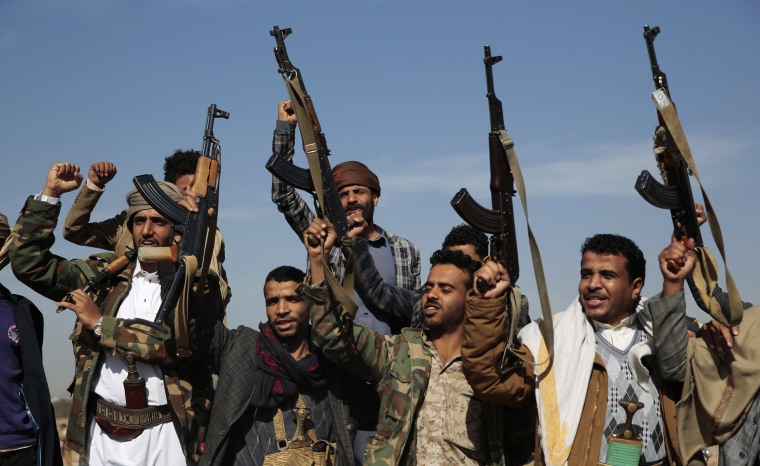WASHINGTON — Despite large-scale U.S. airstrikes against Iranian-backed militants across the Middle East, Iran is continuing to provide weapons and intelligence to its proxies, according to three U.S. officials, a Middle Eastern official and a congressional aide with knowledge of the matter.
Iran’s flow of arms and intelligence to its surrogates across the Middle East, who recently conducted a drone strike in Jordan that killed three American service members and wounded dozens of others, persists even as the Biden administration contends that Tehran does not want a wider war in the region, the sources said.
The assistance from Iran has included intelligence for Houthi forces in Yemen that helps them more precisely attack sites where U.S. forces are stationed in the region, as well as target commercial ships in the Red Sea, according to the U.S. officials.
“They are using intelligence from Iran to give them some targeting information,” Rear Adm. Marc Miguez, the commander of the U.S. carrier strike group currently deployed in the Red Sea, said of the Houthis in an interview with NBC News.
Administration officials have said that a series of airstrikes approved last week by President Joe Biden in response to the deaths of the American service members are designed to send a clear message to Iran and its proxies that the U.S. will not tolerate attacks on its troops or assaults on cargo ships in the Red Sea.
But Iran’s decision to continue sending weapons and intelligence to its proxy forces, which show few signs of halting attacks, suggests that the airstrikes that began Friday have so far done little to blunt Iran's efforts.
Since Friday, Iranian-backed militia have staged at least two attacks on sites where U.S. forces are in Syria. Houthi forces armed by Tehran have also vowed to continue their assaults on commercial vessels off the Yemeni coast.
Biden administration officials have said the U.S. strikes that began Friday are just the beginning of a multifront response that could continue for weeks, and defense officials say the campaign will gradually weaken the proxies’ capabilities over time.
Asked about Iran continuing to help its proxy groups conduct attacks on U.S. forces and interests, a spokesperson for the National Security Council pointed to comments on Sunday by national security adviser Jake Sullivan.
“We do believe that the strikes had good effect in degrading the capabilities of these militia groups to attack us," Sullivan told NBC News’ Kristen Welker on “Meet the Press.” "And we do believe that, as we continue, we will be able to continue to send a strong message about the United States’ firm resolve to respond when our forces are attacked."
One administration official said Iran’s continued funneling of weapons and intelligence to its proxy groups in the Middle East is not a sign of escalation by Tehran. The effort is not indicative of Iran seeking a broader war, the official said, because it’s the same activity Tehran has long engaged in to try to push U.S. forces out of the region.
Last month, U.S. Navy commandos operating off the coast of Somalia seized a shipment of ballistic and cruise missile components — including warheads — intended for Houthi rebels in Yemen, according to the Pentagon. Two Navy SEALs lost their lives in the operation. The interdiction marked the first seizure of advanced Iranian-made ballistic missile and cruise missile parts by the U.S. Navy since 2019, according to the Pentagon.
An Iranian-flagged ship operating in the Red Sea and Gulf of Aden over the last several months illustrates how the regime in Tehran supports Houthi forces threatening commercial trade routes in the area, U.S. officials and analysts say.
The ship, the Beshad, is equipped with electronic surveillance equipment, providing intelligence to Houthi militants that allows them to strike at commercial cargo vessels traveling through one of the world’s most important maritime trade routes, according to U.S. officials and experts.
Iran denies that the Beshad is a spy ship and says it is carrying out an anti-piracy mission. But the regime on Sunday warned against any attempt to potentially target the Beshad or “similar vessels,” an unusual statement that appeared to be designed to pre-empt any U.S. action against the ship.
Pentagon press secretary Air Force Maj. Gen. Patrick Ryder said on Monday the U.S. military was aware of the ship and there were no plans to target it.
Apart from its warning over the Beshad, Iran’s public reaction to the U.S. airstrikes has been relatively muted so far, condemning the bombing raids without threatening to retaliate.
For decades, Iran has cultivated proxies from the Mediterranean to the Gulf of Oman to counter more powerful militaries and to extend its influence, striking at adversaries through partners without leaving clear fingerprints. The United States and its allies have struggled to counter Iran’s proxy network, which is overseen by the country’s Revolutionary Guards’ Quds Force.
In the 1980s, Iran effectively drove the U.S. military out of Lebanon after a group linked to the Iranian-backed Hezbollah militia carried out lethal truck bombings at the U.S. embassy and a Marine barracks. In Syria’s civil war, Hezbollah troops and Iranian-trained Shiite militia — backed by Russian air power — shored up the regime of Bashar al-Assad, pushing back fighters backed by Turkey, Saudi Arabia and other Arab governments.
More recently, Houthi rebels supported by Iran have fought Saudi Arabia and its allies to a stalemate in Yemen, despite heavy bombardment from a Saudi-led coalition.


